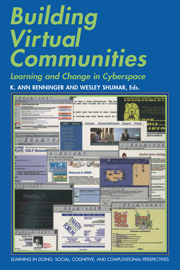Book contents
- Frontmatter
- Contents
- List of Tables and Figures
- Contributors
- Series Foreword
- Preface and Acknowledgments
- Foreword: Virtual Communities for Learning and Development – A Look to the Past and Some Glimpses into the Future
- Building Virtual Communities
- Introduction: On Conceptualizing Community
- Part One Types of Community
- Part Two Structures and Community
- Part Three Possibilities for Community
- 9 Reflexive Modernization and the Emergence of Wired Self-Help
- 10 Understanding the Life Cycles of Network-Based Learning Communities
- 11 Learning in Cyberspace: An Educational View of Virtual Community
- 12 Finding the Ties That Bind: Tools in Support of a Knowledge-Building Community
- Afterword: Building Our Knowledge of Virtual Community: Some Responses
- Afterword: Building, Buying, or Being There: Imagining Online Community
- Index
- References
9 - Reflexive Modernization and the Emergence of Wired Self-Help
Published online by Cambridge University Press: 12 November 2009
- Frontmatter
- Contents
- List of Tables and Figures
- Contributors
- Series Foreword
- Preface and Acknowledgments
- Foreword: Virtual Communities for Learning and Development – A Look to the Past and Some Glimpses into the Future
- Building Virtual Communities
- Introduction: On Conceptualizing Community
- Part One Types of Community
- Part Two Structures and Community
- Part Three Possibilities for Community
- 9 Reflexive Modernization and the Emergence of Wired Self-Help
- 10 Understanding the Life Cycles of Network-Based Learning Communities
- 11 Learning in Cyberspace: An Educational View of Virtual Community
- 12 Finding the Ties That Bind: Tools in Support of a Knowledge-Building Community
- Afterword: Building Our Knowledge of Virtual Community: Some Responses
- Afterword: Building, Buying, or Being There: Imagining Online Community
- Index
- References
Summary
In post traditional contexts, we have no choice but to choose how to be and how to act … choice has become obligatory.
– Giddens, 1994a, pp. 75–6The computer mediated sharing of common interests, experiences, thoughts, and fellowship combined with an ability to access health and welfare information and/or challenge professional monopolies of expertise is becoming ubiquitous. This is especially true in the United States (Denzin, 1998; Ferguson, 1996) but is also increasing on a globalscale (Burrows et al., 2000). At the time of writing, the bulk of Internet traffic relating to online self-help, and social support occurs within the almost 20,000 different Usenet news groups. Also important are the 100,000 or so publicly accessible discussion lists. However, given the recent trend for different forms of computer-mediated communication (CMC) to coalesce with Web pages to form more integrated systems of information and online support (offering perhaps Web-based information services alongside integrated provision to join mailing lists, discussion groups, and/or to engage in real-time chat), the virtual geography of wired self-help and social support is in a state of some flux. This chapter asks what sociologists are to make of the emergence of these wired forms of self-help and social support?
We begin with an illustration of the sort of “virtual community care” and support with which we are concerned.
Information
- Type
- Chapter
- Information
- Building Virtual CommunitiesLearning and Change in Cyberspace, pp. 249 - 268Publisher: Cambridge University PressPrint publication year: 2002
References
Accessibility standard: Unknown
Why this information is here
This section outlines the accessibility features of this content - including support for screen readers, full keyboard navigation and high-contrast display options. This may not be relevant for you.Accessibility Information
- 7
- Cited by
